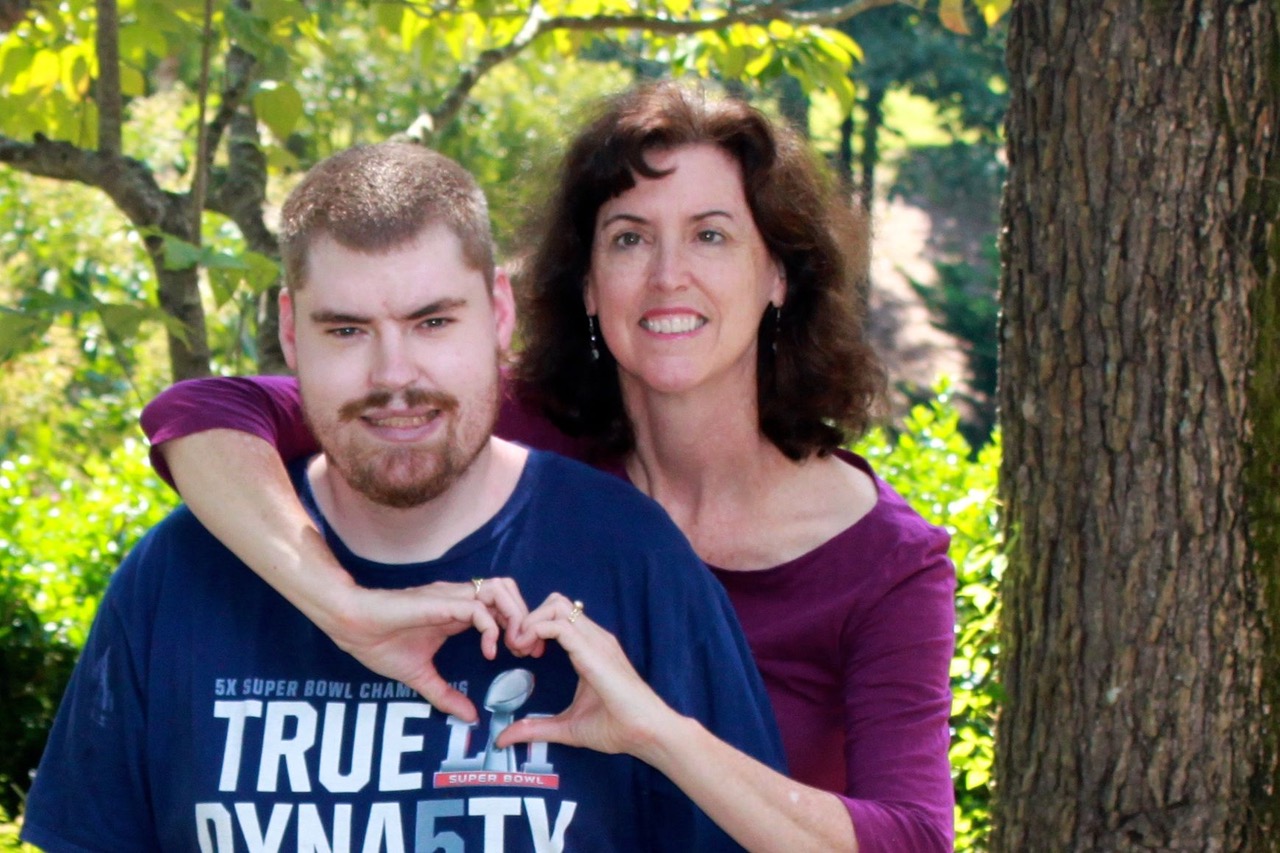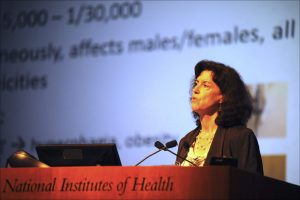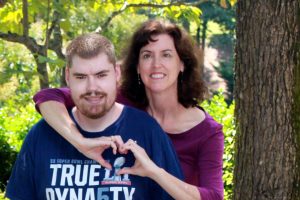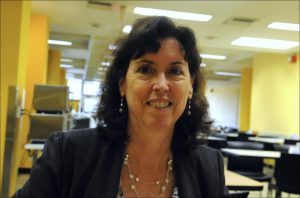Alabama Scientist, Mom Spearheads Prader-Willi Research

Theresa Strong and her son Daniel, who has Prader-Willi. (Photo courtesy Jim Strong)
If Theresa Strong didn’t keep the family fridge locked, her 23-year-old son Daniel might very well eat himself to death.
It sounds shocking, but that’s part of the daily routine for parents of children and young adults with Prader-Willi syndrome (PWS), a complex genetic disorder that affects about 1 in every 15,000 live births in the United States.
“These kids are hungry all the time. It’s a rare thing, but they can literally eat until they rupture their stomachs. They don’t experience that feeling of fullness,” she said. “They go from not being hungry as babies to being overly hungry. Usually by the time they’re 8 or 10, hyperphagia [excessive appetite] has set in. Most often, it’s just a deletion of a particular gene on chromosome 15.”
In about 60 percent of cases, PWS is caused by a small deletion on the chromosome 15 inherited from the father’s side. Another 37 percent of PWS cases stems from maternal uniparental disomy (two chromosome 15s from the mother, none from the father). An “imprinting defect” causes the remaining 3 percent of cases.
“It usually happens at conception, and most of the time, there’s a low risk of recurrence,” Strong said. “I have four kids, and the other three are not at increased risk for PWS.”
FPWR established by ‘three moms around a kitchen table’
Strong, who lives in Birmingham, Alabama, is the director of research programs at the Foundation for Prader-Willi Research (FPWR), which is based in the Los Angeles suburb of Walnut, California. She spoke to Prader-Willi Syndrome News during the recent Rare Disease Day 2018 event sponsored by the National Institutes of Health (NIH) in Bethesda, Maryland.
Co-founder Strong said the foundation was established in 2003 “by three moms around a kitchen table” who had met on a Yahoo discussion group.
“It’s a really complex disorder, and we had a vision about how to address that need,” she said. “Our organization wanted to focus on advancing research and therapeutic development. We started with a competitive grant program, awarding small grants to individual investigators.”
The foundation also initiated the Global Prader-Willi Syndrome Registry, a collaboration with the Florida-based Prader-Willi Syndrome Association, which was founded in 1975.
FPWR operates on a $2.5 million annual budget and employs four scientists full time. The group claims a social media reach of more than 20,000, as well as its own private Facebook network.
Strong volunteered at FPWR for 12 years, she said, “but there’s so much going on that I started full time a little over a year ago.”
Obese PWS teen wins Mississippi beauty contest
A geneticist by training, Strong earned her PhD from the University of Alabama at Birmingham. She did post-doctoral studies on cystic fibrosis with Francis Collins — a world-renowned geneticist who led the Human Genome Project and is now the director of the NIH. Eventually, she returned to UAB, where she worked to develop gene therapy strategies to treat cancer.
Unlike some other cases, where moms and dads of rare-disease children go back to school for advanced science degrees to learn about their kids’ illnesses, in Strong’s case it was the reverse.
“The last year of my post-doc, I had twins, one of whom has Prader-Willi,” she said. “So I was a scientist first, and then had a kid with a rare genetic disorder. I didn’t really intend to be involved on a personal level.”
In somewhat of an irony, she said, “kids are sometimes recognized as having PWS shortly after they’re born, because they’re very hypotonic. Their muscles are very weak, and they have a hard time feeding. They can’t breastfeed, and oftentimes don’t bottle-feed well. Daniel has it, but his twin brother, Christopher, is as skinny as can be.”
In neighboring Mississippi, 15-year-old Anna Hankins, who has PWS, recently won the state’s Miss Amazing 2018 Junior Teen beauty contest after she appeared on-stage, wearing a sparkly pastel pink dress, and sang “Amazing Grace.” Later this year, Anna will represent Mississippi at the national competition in Chicago, according to a March 27 feature in The Washington Post.
‘Refrigerator has a bicycle lock’
At present, Daniel is 5-foot-7 and weighs 188 pounds, Strong said, “but that’s because we control everything in his environment. If we didn’t, he would easily weigh 300 or 400 pounds.”
Among other things, the young man is restricted to 1,400 calories per day. Because of his illness, the Strong family — like many others touched by PWS — tends to shy away from social events where there’s going to be food.
“Our refrigerator has a bicycle lock on it, our pantry has a keypad entry, and we decide ahead of time what Daniel gets to eat each day,” she said. “If you do not control their environment, these kids will become morbidly obese. They will often choke because they don’t swallow well and are really intense about eating.”
On the other hand, Daniel’s parents do allow him to go out once a month with friends.
“He very much wants to be like his peers, and it’s not normal when you’re a teenager or young adult for your mother to be restricting your food,” she said. “His body is not getting the signal that he’s full.
“It’s misreading the signal because his hypothalamus is not integrating the information,” she explained. “People with PWS have a lot of anxiety, some OCD behavior and cognitive rigidity, so it’s hard for them to move from one thing to another. They are also prone to temper outbursts all the way to adulthood.”
General obesity treatments may help PWS patients, too
Teenagers and young adults with PWS sometimes get arrested for shoplifting for trying to steal food. They’re also more likely to be involved in accidents, and they have higher rates of mental illness, bipolar affective disorder, and major depression, as well as other health complications — leading to a shorter life expectancy.
Despite an increased risk of early death, however, some PWS patients have lived well into their 50s and 60s, she said.
Meanwhile, Strong advises, “you can’t tell our kids to diet, though we’re really fortunate that new drugs being developed for general obesity may have applications for PWS.”
Yet even if children with PWS are of normal weight, they generally have excessive fat and low muscle mass. In Daniel’s case, he has a personal trainer who helps him with aerobics exercises and weight resistance to increase muscle mass and stabilize his weight.
Asked about gastric bypass operations for PWS patients, Strong said a small number of individuals have undergone the procedure, but that there have been some deaths.
“Most experts I’ve talked to think it would be an extremely risky procedure for someone with PWS,” she said. “Really, at the current time, it’s more about environmental control and 24/7 supervision, regulating access to food. Growth hormone therapy has also been approved in PWS, and that does appear to improve body composition. But unfortunately, it doesn’t decrease the appetite.”








